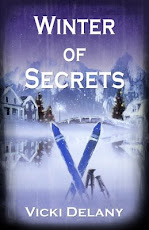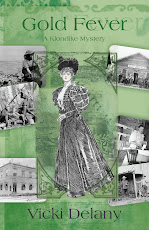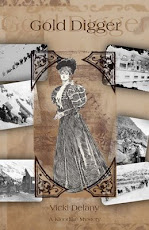In the latest book by Vicki Delany, a middle-aged and married mother of two heads out on a trail for a healthy, head-clearing hike on the first day of spring — and is then picked off by a sniper.

A COLD WHITE SUN
By Vicki Delany
Poisoned Pen Press, $24.95 and $14.95
- - -
Vicki Delany should be better known than she is, as a sterling Canadian crime novelist who has created a world in a British Columbia town and populated it with characters who manage to be not only lively and intriguing, but reassuringly reliable company, as well.
A Cold White Sun is Delany’s sixth novel starring Constable Molly Smith (along with her superior officer Sergeant John Winters) of the police force in the mountain town of Trafalgar B.C.
The place is a sports resort for tourists, but also a town where people actually live, go to school, run businesses, hang out. Molly herself is virtually a lifelong resident, and her mother is a well-known local activist. John Winters’ wife Eliza, an ex-supermodel, meanwhile runs an art shop.
And then there’s Cathy Lindsay, a middle-aged, married mother of two, a high school English teacher and occasional creative writing instructor. This apparently ordinary, inoffensive woman rises early on the first day of school spring break intending a healthy, head-clearing hike with her dog — until on a trail high above town, she is picked off by a sniper.
The question immediately becomes not only who has shot her, but whether she was targeted, or a mistake, or a random victim.
In any unwitnessed murder, those closest to the victim inevitably get looked at first. Cathy’s husband, an Internet developer who evidently was getting breakfast for his kids at the time of her death, is first to be queried by Winters and Smith. Hovering unhappily in the background, too, is their teenaged son, well known to police as a sullen, troubled kid given to petty crimes.
But the case for randomness is also strong — the chances of an armed nutcase, possibly a well-trained, unhinged military veteran roaming the region, aren’t awfully remote, and they’re much scarier than the notion of someone who was only aiming at Cathy. Random targeting would mean anyone at all could be in danger, as would the notion that the gunman mistook her for someone else.
There are, after all, lots of strangers around, as well as dodgy residents. One might be a man determined on a solitary, isolated life; or the fellow who becomes a sad obsession for an employee at Eliza Winters’ art shop.
A reader might even have suspicions of a skier with whom Molly takes up, at least on the slopes, in the absence of her cop boyfriend Adam.
There are, in fact, plenty of options for suspicion and investigation, including some that arise from around-the-town information picked up by Molly’s mother, as well as Eliza Winters.
The course of the plot to its resolution makes a good deal more sense than occurs in a lot of crime fiction, but just as important, getting to it, through various investigative false trails and personal twists, is suspenseful and solid.
The only remaining mystery at the end is why Vicki Delany isn’t yet as famous a crime writer, both nationally and internationally, as such fellow Canadians as Louise Penny or Linwood Barclay. Maybe this is the novel to fix that — and send readers in search of her backlist, as well.
Joan Barfoot is a novelist living in London












No comments:
Post a Comment